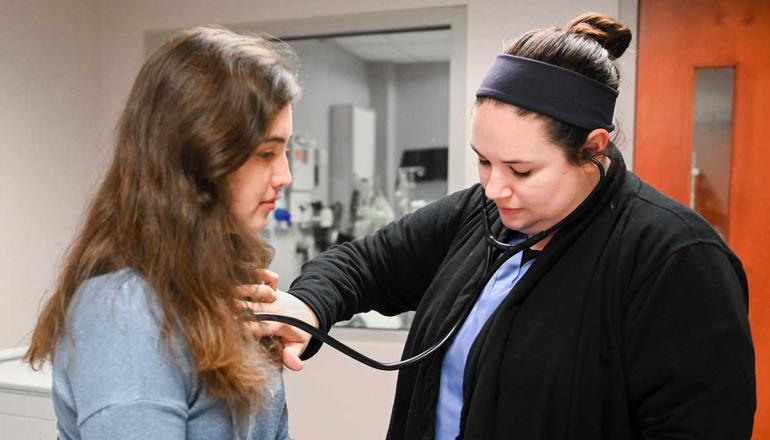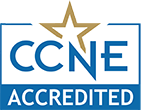Nurse Practitioner

Our program is a rigorous, full-time program. The program requires a significant commitment for successful completion of didactic and clinical course experiences. For this reason, we do not encourage students to maintain full-time employment while enrolled in the program. Each student has his/her own individual responsibilities. If employment is essential, students are encouraged to explore flexible part-time employment and utilize saved vacation or other leave that can afford more time to commit to the program.
The application deadline is March 1 for an August (Fall semester) start.
The Nurse Practitioner Concentration at the University of Tennessee at Chattanooga School of Nursing offers the following specialty track options:
- Acute Care Nurse Practitioner Adult Gerontology
- Family Nurse Practitioner Lifespan
- Psychiatric Mental Health
The DNP FNP and ACNP-AG programs are each 8 semesters (2.5 years) full-time study. ACNP-AG consists of 80 credit hours and 1,050 clinical hours. The FNP program consists of 83 credit hours and 1,050 clinical hours. Courses are delivered in a variety of formats including online, hybrid, and face to face. Clinical/practicum courses provide experiential learning. The Psychiatric Mental Health Nurse Practitioner (PMHNP) program is 8 semesters in length and 82 credit hours.
Acute Care Nurse Practitioner Adult Gerontology
Didactic and clinical coursework with preceptorships in Advanced Acute Care, Advanced Critical Care, and an Adult Geriatric Acute Care Nurse Practitioner Residency prepares students for the national certification exam offered by the American Nurses Credentialing Center (ANCC) as an ACNP-AG. The student's education provides theoretical and evidence-based clinical knowledge and learning experiences emphasizing the development of clinical expertise needed to provide care for young adults (including late adolescents), adults, and older adults (including young-old, old, and old-old adults) in the acute care setting. Course work prepares students in theoretical foundations for advanced practice, health care policy, and clinical assessment and management.
Students have didactic and clinical courses concurrently, reinforcing course work in the clinical setting. Courses include advanced pathophysiology, advanced health assessment, and advanced pharmacology. From there, students complete the advanced practice core courses and the role-specific courses in Advanced Acute Care and Advanced Critical Care. The final practicum allows immersion in the role as an ACNP-AG. Once certified, students may begin work as an ACNP-AG feeling confident that they have the skills needed to work in acute care.
Family Nurse Practitioner Lifespan
Didactic and clinical coursework with preceptorships in Adult, Women and Pediatric Primary Care prepares students for the national certification exam offered by either the American Nurses Credentialing Center (ANCC) or the American Academy of Nurse Practitioners (AANP) as a FNP. The student's education provides theoretical and evidence-based clinical knowledge and learning experiences for role development as a family nurse practitioner, emphasizing the development of clinical expertise needed to deliver primary care for families. Course work prepares students in theoretical foundations for advanced practice, professional role, health care policy, and clinical assessment and management.
Students have didactic and clinical courses concurrently, reinforcing classroom work in the clinical setting. Courses include advanced pathophysiology, advanced health assessment, and advanced pharmacology. The final family nurse practitioner practicum allows immersion in the role as an FNP. Once certified, students who earn their DNP as a Family Nurse Practitioner from UTC may begin work immediately as a graduate FNP feeling confident that they have the skills needed to work in primary care as well as a variety of settings.
Students who complete our Nurse Practitioner Concentration at UTC traditionally score above the national average on their certification examination. For the last 10 years, our Family Nurse Practitioner graduates had a 100% first time pass rate while our Adult Gerontology Nurse Practitioner graduates had a 90% first-time pass rate. The overall the first-time pass rate all NP students is above 96%.
The Psychiatric Mental Health Nurse Practitioner (PMHNP) program is 8 semesters in length and 82 credit hours. Students have didactic and clinical courses concurrently, reinforcing classroom work in the clinical setting. Didactic and clinical coursework with preceptorships in various psychiatric settings and populations (family, special populations, individual, adult, geriatric, and pediatric) allows for immersion in the role of a PMHNP. The student's education provides theoretical and evidence-based clinical knowledge and learning experiences for role development as a PMHNP, emphasizing the development of clinical expertise needed to deliver patient centered psychiatric care. This prepares students for the national certification exam offered by either the American Nurses Credentialing Center (ANCC) or the American Academy of Nurse Practitioners (AANP) as a PMHNP. Once certified, students may begin work immediately feeling confident that they have the skills needed to work in primary care and various settings.
UTC offers post-graduate certificates in Family Nurse Practitioner Lifespan (FNP-L) and Adult Gerontology Acute Care Nurse Practitioner (AGACNP), and Psychiatric Mental Health Nurse Practitioner (PMHNP). The certificates are offered for those who are already practicing Nurse Practitioners, either MSN or DNP prepared. Programs of Study from other institutions may be reviewed to ensure appropriate prior coursework has been completed.
Students who complete our Nurse Practitioner Concentration at UTC traditionally score above the national average on their certification examination. For the last 10 years, our Family Nurse Practitioner graduates had a 100% first-time pass rate while our Adult Gerontology Nurse Practitioner graduates had a 90% first-time pass rate. The overall first-time pass rate for all NP students is above 96%
Post-graduate Certificate FNP-L
The post-graduate FNP is 4 semesters and 25 credit hours. Students have didactic and clinical courses concurrently, reinforcing classroom work in the clinical setting. Didactic and clinical coursework with preceptorships in Adult, Women, Pediatric Primary Care, and the final family nurse practitioner practicum allows immersion in the role as an FNP. The student's education provides theoretical and evidence-based clinical knowledge and learning experiences for role development as a family nurse practitioner, emphasizing the development of clinical expertise needed to deliver primary care for families. This prepares students for the national certification exam offered by either the American Nurses Credentialing Center (ANCC) or the American Academy of Nurse Practitioners (AANP) as a FNP. Once certified, students may begin work immediately feeling confident that they have the skills needed to work in primary care as well as a variety of settings.
Post-graduate Certificate AGACNP
The post-graduate AGACNP is 5 semesters and 23 credit hours. Didactic and clinical coursework include preceptorships in Advanced Acute Care, Advanced Critical Care, and an Adult Geriatric Acute Care Nurse Practitioner Residency. The final Residency allows immersion in the role as an AGACNP. The student's education provides theoretical and evidence-based clinical knowledge and learning experiences emphasizing the development of clinical expertise needed to provide care for young adults (including late adolescents), adults, and older adults (including young-old, old, and old-old adults) in the acute care setting. This prepares students for national certification exams offered by the American Nurses Credentialing Center (ANCC) or the American Association of Critical Care Nurses (AACN) as an AGACNP. Once certified, students may begin work as an AGACNP feeling confident that they have the skills needed to work in acute care.
Post-graduate Certificate PMHNP
The post-graduate PMHNP is 5 semesters and 28 credit hours. Students have didactic and clinical courses concurrently, reinforcing classroom work in the clinical setting. Courses include Principles of Individual, Group and Family Counseling Evaluation, Diagnosis and Management of the Psychiatric Mental Health Client, and courses in Psychiatric/Mental Health Diagnosis and Management for the Adult and in Special Populations. The final practicum immerses the student in the clinical management setting.
The student's education provides theoretical and evidence-based clinical knowledge and learning experiences for role development as a family nurse practitioner, emphasizing the development of clinical expertise needed to deliver primary care for families. This prepares students for the national certification exam offered by either the American Nurses Credentialing Center (ANCC) or the American Academy of Nurse Practitioners (AANP) as a PMHNP. Once certified, students may begin work immediately feeling confident that they have the skills needed to work in primary care as well as a variety of settings.

The doctor of nursing practice degree at the University of Tennessee at Chattanooga is accredited by the Commission on Collegiate Nursing Education (http://www.ccneaccreditation.org).
